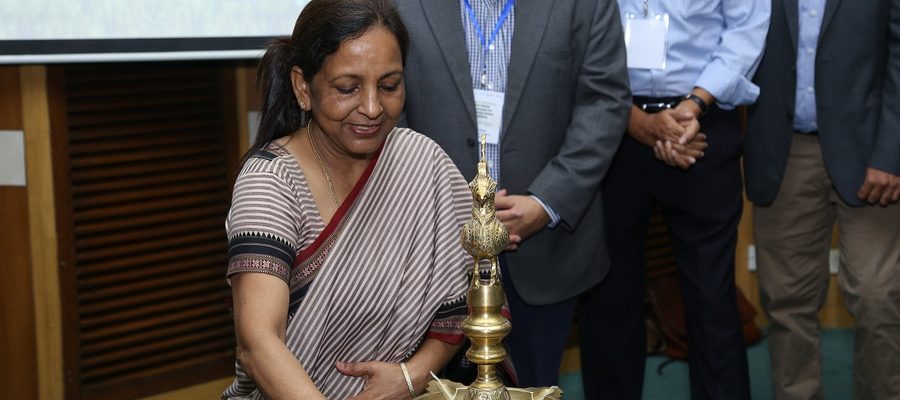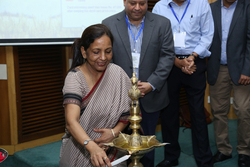Peri-Urban Ecosystems for Enhancing Urban Resilience

The two-day conference ‘Peri-Urban Ecosystems for Enhancing Urban Resilience’ was held on the 18th and 19th of September in New Delhi.
The event witnessed some key remarks from speakers such as Dr. Shiraz A. Wajih – President, Gorakhpur Environmental Action Group (GEAG), Mr. Emani Kumar – Deputy Secretary General, ICLEI and Executive Director ICLEI South Asia, Prof. Chetan Vaidya – Director, School of Planning and Architechture, Delhi, Ashvin Dayal – Associate Vice President and Managing Director (Asia), The Rockefeller Foundation, Thailand and Dr. Amita Prasad (IAS), Additional Secretary, Ministry of Environment, Forest and Climate Change, Government of India among others.
Mr. Emani Kumar shared the projects and initiatives, by ICLEI South Asia, that are helping to build resilience in an inclusive manner considering both urban and peri-urban issues. He specifically mentioned the Urban Nexus – for which partners, stakeholders and government associations need to be brought together, and CITYFOOD network for food sustainability to ensure food supply in the target areas.
“We have initiated integrated water management in peri-urban areas – two cities in Maharashtra. We recently started a project called INTERACT-Bio in Kochi, Mangalore and Panaji where various activities were conducted,” he said.

Dr. Prasad, who was the chief guest at the event, inaugurated the session with focusing on the need to look at climate resilience against the climate change. She insisted on looking at the small issues first which build up to a greater resilience, before we get to the bigger issues.
“We don’t look at adhocism. I know we can’t avoid the political agenda, but we have to look at the big picture. We are not making our cities livable. I am hoping in these two days, you will come up with an integrated approach. The answer lies in the question itself,” she told the audience.
The inaugural session was followed by the release of Training Handbook on ‘Urban Resilience and Sustainability through Peri-Urban Ecosystems- Integrating Climate Change Adaptation and Disaster Risk Reduction, Process Guidance and Training Handbook’.
The highlight of the event was on the second day, when the event witnessed a session with mayors of some of the Indian cities and neighbouring countries as panelists. The session was moderated by Emani Kumar – Deputy Secretary General, ICLEI and Executive Director – ICLEI South Asia. And the panelists were – Md. Zannatul Ferdous, Mayor, Singra, Bangladesh, H.M. Ahidul Islam, Mayor, Kotalipara, Bangladesh, Md. Abdul Mozid, Mayor, Kakonhat, Bangladesh, Mr. Khandakar Mourshad Rahman, Mayor, Madhukali, Bangladesh, Mr. Asok Bhattacharya, Mayor, Siliguri, West Bengal, India, Mr. Shakti Singh Chaudhary, Mayor, Gangtok, Sikkim, India, Mr. Dipak Babu Kandel, Mayor, Palungtar, Nepal, Mrs. Shobha Banashetti, Mayor, Solapur, Maharashtra, India, Mr. Tikender Panwar, Former Dy Mayor, Shimla, India.
Mr. Haque expressed his concern for Padma River in Bangladesh which is affected by the climate change due to which there is water scarcity and flooding, and as a result the banks are dry. Farmers have to use drainage water for their lands, and people don’t want to buy the fish, and the vegetables because of health reasons, he said. However, despite these issues, they are planning to make the city green, and ensure mobility for women and children.
Mr. Chaudhary addressed Sikkim as the only organic state in the country. He started with the state’s achievements as it has banned plastic and fertilisers. In 2000, they even banned the use of crackers.
“We believe it is the individuals who have to do it, government can only come up with policies. We can’t just do the "talk". Like here I see we are using plastic water bottles, you should keep denying only then the government will be forced to ban it,” he said.
Mr. Panwar said that there should be a democratisation of the surplus. When it comes to giving it back to peripherals, again we charge more. Massive flow of capitalism is taking place. He said that the working class is the one who stays in the peri-urban areas, and they are mostly engaged in the informal sector. He presented Shimla’s example – when the city was preparing its application for smart cities proposal, ‘water’ was identified as the core problem but the public corrected it to ‘transport’ being the bigger problem. He focused on how people’s participation should be encouraged in these peri-urban areas, and a regional plan should come in place.




